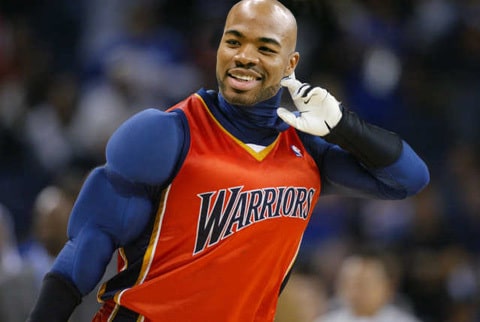
At the beginning of the NBA season, a pretty basic TMZ Sports video appeared with former NBA players Corey Maggette and Cuttino Mobley. They were asked about load management in today’s NBA, and whether or not they felt like it was a good move.
Maggette, who spent the majority of his career with the Los Angeles Clippers, was being asked specifically in regards to the way the current team was handling Kawhi Leonard. Maggette showed strong support by saying he loved the idea of load management.
He even went as far as to say that load management would have helped his career. Looking back, would Maggette’s career be different from a load management plan in place?
Injury issues
The playing style of Corey Maggette was bound to lead to some injuries along the way. He was a bruising wing player who relied on getting to the line to be an efficient scorer. At times, he was forced to play as an undersized power forward, which meant a lot of rough play against bigger and stronger players.
The most games Maggette played in his career was 75, and he missed quite a few games throughout his career due to injury. His most significant injury came in 2005-2006, where he only played 32 regular-season games before ramping up for the playoffs.
In the interview with TMZ, Maggette cited knee injuries as the main reason he was forced to retire. He was just 33 years old when he played 18 games for the Detroit Pistons in 2012–2013, and he was never seen on an NBA team again. With load management from an early age, his body might have stayed healthy enough to play a few more years.
The goal of load management
Maggette, and other players from a previous era, might initially take pride in going out there and playing every single night. However, load management studies have shown that an 82 game season for even the best athletes can be a pretty tough task. The older a player gets, the more rest they need in between games.
The hard part for players like Maggette during his prime was that he was one of the key components of his team. He was a go-to option on offense, and his team usually could not get by without having him on the floor. Taking games off would throw away precious opportunities to pick up wins for a playoff push.
Teams that can benefit from still making the playoffs, while resting their best players strategically, can significantly benefit from load management. It is not something that particularly pleases fans when they see players missing games without an actual injury, but the goal is to have them healthy and ready to go for the most important parts of the season.
Long-term health
Another factor that plays into load management is thinking past an NBA career. Having a long-term vision on health can change how players act when they are grinding in the NBA. It is one thing to play hard every single night and strive to be the best, but pushing the body to the limit could also cause long term health issues.
As players and teams learn more about long-term health, people are warming up to the idea of load management. Maybe a player like Maggette at 19 or 20 wanted to play basketball every single day for hours and hours, but at 40, he can see the negatives of that.
Would a few extra seasons change Maggette’s legacy?
Maggette proved during his NBA career that he could score efficiently and defend multiple positions. What he never had the chance to do later in his career is to be a part of a talented title-contending team. Even if he would be just a role player, healthy knees could have allowed him that chance.
It is easy for any retired player to play the what-if game, but the injuries for Maggette were very real. His knees robbed him of a few additional years, and load management might have made the difference.
Also Read- Cristiano Ronaldo Net Worth 2020- Is he Richest Sportsperson?










